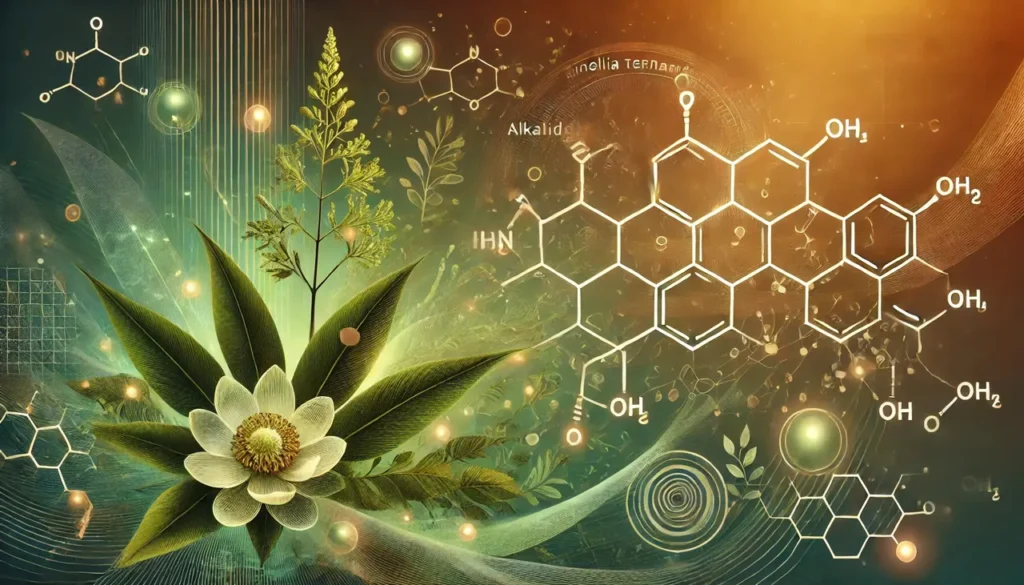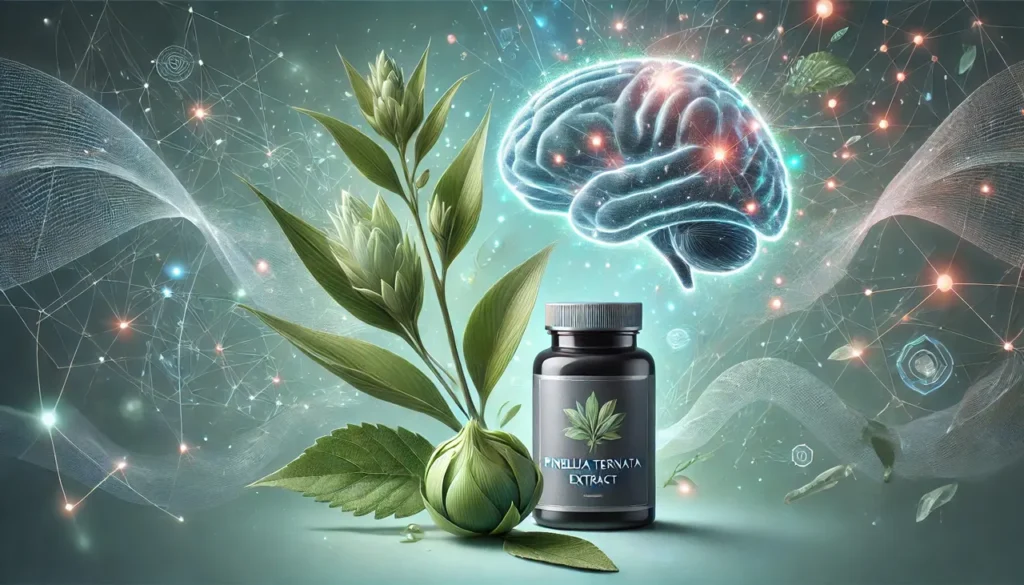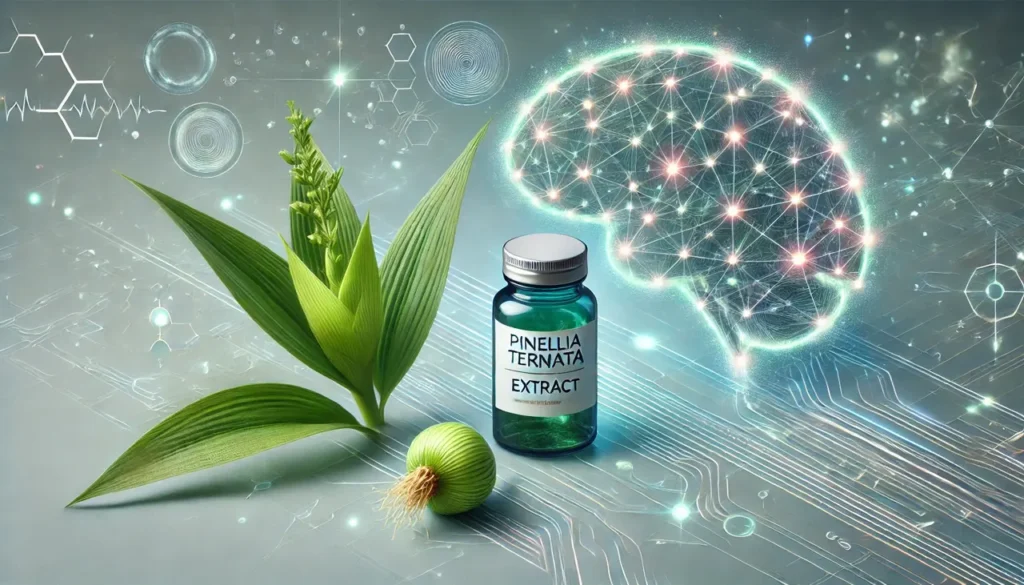Pinellia ternata, commonly known as Ban Xia in traditional Chinese medicine (TCM), is a perennial herb in the Araceae family that has been used for centuries in East Asian medicinal practices. This plant is primarily valued for its effects on the respiratory and digestive systems. Recently, researchers and herbalists have started to explore its potential nootropic benefits, hypothesizing that the plant’s active compounds might positively influence cognitive function. This article provides an in-depth examination of Pinellia ternata, including its chemistry, physiological mechanisms, potential nootropic effects, dosage guidelines, side effects, interactions, and considerations for safe supplementation.
You May Also Like:
Source and Traditional Uses of Pinellia Ternata
Pinellia ternata is native to East Asia, where it thrives in moist environments. The plant’s rhizome (underground stem) is the part used medicinally, typically dried and processed to mitigate its natural toxicity. Pinellia ternata is particularly known in TCM for addressing issues related to phlegm, cough, nausea, and digestive discomfort.
Traditionally, Pinellia ternata is processed with ginger to reduce its irritant properties and make it safer for consumption. The plant’s bioactive compounds are believed to act on the gastrointestinal system, respiratory system, and potentially the central nervous system, suggesting a range of therapeutic applications, including for mental and cognitive health.
Discover the Key to Brain, Mental, and Cognitive Wellness with Bacopa Monnieri—Buy Now on Amazon!

Chemistry of Pinellia Ternata
The bioactive compounds in Pinellia ternata include alkaloids, flavonoids, and glycosides. Several of these compounds are thought to contribute to the plant’s pharmacological activities:
- Ephedrine and Pseudoephedrine: These alkaloids are present in small quantities and could stimulate the central nervous system, potentially enhancing alertness. Ephedrine acts as an adrenergic receptor agonist, stimulating the release of norepinephrine and dopamine in the brain.
- Pinelloside: This glycoside, unique to Pinellia ternata, may possess anti-inflammatory and neuroprotective properties. Pinelloside’s precise mechanism of action in the brain remains under investigation, but it’s thought to reduce inflammation and oxidative stress.
- Lectins: These are proteins that bind carbohydrates and may support immune function and cell communication. Lectins in Pinellia ternata may help mediate cellular interactions, although their role in cognitive health is still being explored.
Due to these compounds, researchers are investigating Pinellia ternata as a possible nootropic supplement for its potential ability to modulate neurotransmitters and protect neurons from oxidative stress.

Physiological Mechanisms and Effects on the Brain
Pinellia ternata’s purported nootropic effects are largely speculative and based on its traditional uses and chemical composition. The physiological effects of Pinellia ternata on the brain may involve several potential mechanisms:
- Anti-Inflammatory Effects: Chronic inflammation has been implicated in neurodegenerative diseases, such as Alzheimer’s and Parkinson’s. Compounds in Pinellia ternata, including pinelloside and certain flavonoids, may reduce inflammation, thereby protecting neural tissues from damage.
- Antioxidant Properties: Oxidative stress is a significant factor in aging and cognitive decline. By reducing free radicals and oxidative damage, Pinellia ternata’s antioxidants may support brain health and prevent age-related decline.
- Neurotransmitter Modulation: The presence of mild stimulants, such as ephedrine, suggests that Pinellia ternata could increase the availability of norepinephrine and dopamine in the brain, enhancing alertness and potentially supporting memory and learning processes.
While these properties suggest possible cognitive benefits, further research is needed to substantiate the effects of Pinellia ternata on human brain function. Clinical trials are necessary to determine if these mechanisms translate to real cognitive benefits in healthy or aging individuals.
Experience Enhanced Brain Function and Vital Energy with Panax Ginseng—Shop Amazon’s Best Now!

Potential Nootropic Benefits of Pinellia Ternata
Given the limited scientific research, the cognitive benefits of Pinellia ternata remain hypothetical. However, based on its pharmacology and traditional use, the following nootropic effects may be possible:
- Enhanced Alertness and Focus: The adrenergic effects of ephedrine and similar compounds might enhance focus and reduce mental fatigue, especially during mentally demanding tasks.
- Memory Support: By reducing inflammation and oxidative stress, Pinellia ternata could theoretically protect neurons, which may aid memory retention and cognitive processing over time.
- Mood Stabilization: The herb’s potential to modulate neurotransmitter levels may support emotional stability and resilience to stress, enhancing overall cognitive performance indirectly by promoting a stable mood.
- Anti-Anxiety Effects: Some compounds in Pinellia ternata may help reduce anxiety by supporting balanced neurotransmitter activity, potentially creating a calming effect that aids mental clarity and overall cognitive function.
- Stress Reduction: Pinellia ternata may help mitigate the effects of stress by modulating the body’s stress response. By promoting relaxation and reducing levels of cortisol, the primary stress hormone, this plant could enhance overall resilience to stressors, contributing to better mental health and emotional stability.

Dosage and Supplementation Guidelines
Due to the lack of established dosage guidelines, it is crucial to approach Pinellia ternata supplementation with caution. In TCM, Pinellia ternata is typically used in combination with other herbs and processed to mitigate its natural toxicity. However, the following dosage information can serve as a general guideline:
- General Supplement Dosage: For cognitive support, starting with 100-250 mg of Pinellia ternata extract daily is considered a conservative approach. Higher doses should be avoided until more research on efficacy and safety is available.
- Traditional Dosage: In TCM, dosages range between 3 and 9 grams of the dried rhizome, typically boiled or processed with ginger to reduce its toxicity. This form is used primarily for respiratory and digestive support rather than nootropic effects.
- Capsules and Extracts: Standardized extracts are often available in capsules. Users are advised to follow manufacturer instructions and consider consulting a healthcare provider before initiating supplementation.
Given the limited data on its long-term effects, individuals should avoid using Pinellia ternata for extended periods without medical supervision. Pregnant or breastfeeding women should avoid this supplement due to potential risks to fetal development.
Relax Your Mind and Body for Better Sleep with High-Quality Supplements—Buy Today on Amazon!

Side Effects and Safety Considerations
Pinellia ternata has been associated with several adverse effects, especially if used improperly. The raw herb contains compounds that are irritants and can be toxic, so it is typically processed before use. Possible side effects include:
- Gastrointestinal Issues: Unprocessed Pinellia ternata may cause nausea, vomiting, and abdominal pain. The processed form, used in supplements, is less likely to cause these effects but may still cause mild digestive disturbances in some individuals.
- Respiratory Irritation: Raw Pinellia ternata could irritate the respiratory tract, potentially causing cough or difficulty breathing. While supplements are less likely to produce these effects, those with respiratory conditions should exercise caution.
- Allergic Reactions: Some people may experience allergic reactions, including itching, rash, or swelling. Individuals with known allergies to plants in the Araceae family should avoid Pinellia ternata.
Given these potential side effects, it is essential to use Pinellia ternata cautiously and to start with a low dose.
Interactions with Other Supplements and Medications
Pinellia ternata may interact with various medications and supplements. These interactions could increase the risk of side effects or reduce the effectiveness of certain medications:
- Stimulant Medications: Pinellia ternata contains compounds that could stimulate the central nervous system, potentially enhancing the effects of stimulant medications, such as those used for ADHD. This may increase the risk of side effects like jitteriness, rapid heart rate, and high blood pressure.
- Sedatives and Antidepressants: Due to its potential to modulate neurotransmitter levels, Pinellia ternata might interfere with medications affecting the central nervous system, including sedatives and some antidepressants. Individuals on these medications should avoid this supplement unless directed by a healthcare provider.
- Anticoagulants: Certain components of Pinellia ternata may impact blood clotting. Those taking anticoagulant or antiplatelet drugs should avoid this supplement to prevent increased bleeding risk.
- Herbal Interactions: Pinellia ternata is commonly used with ginger in TCM. Combining it with other herbs that have stimulant or sedative effects may alter its impact on the central nervous system, potentially leading to unexpected side effects.

Risks for Individuals with Certain Health Conditions
While Pinellia ternata is generally safe when used in processed form and in small doses, individuals with specific health conditions should exercise caution:
- Pregnancy and Lactation: Due to a lack of safety data, pregnant and breastfeeding women should avoid Pinellia ternata. Its potential effects on fetal development and infant health are unknown, and it may pose risks during these sensitive periods.
- Cardiovascular Disease: Individuals with heart conditions should be cautious when using Pinellia ternata due to its mild stimulant effects, which may increase heart rate and blood pressure. Those with hypertension or other cardiovascular conditions should consult a healthcare provider before using this supplement.
- Respiratory Disorders: Since unprocessed Pinellia ternata could irritate the respiratory tract, individuals with asthma or chronic obstructive pulmonary disease (COPD) should avoid using this herb. Even processed supplements should be used with caution by those with respiratory conditions.
Should You Consider Pinellia Ternata as a Nootropic?
Pinellia ternata offers several intriguing properties, such as potential antioxidant and anti-inflammatory effects, that could support cognitive function. However, the nootropic potential of Pinellia ternata is still largely speculative, as few scientific studies have rigorously tested its effects on brain health. While traditional medicine recognizes its benefits for respiratory and digestive health, its use as a cognitive enhancer remains an emerging area of interest.
Due to the limited evidence, those considering Pinellia ternata as a nootropic should approach it cautiously, especially regarding dosage, interactions, and possible side effects. Consulting a healthcare provider before starting any new supplement is essential, particularly for individuals with existing health conditions or those taking other medications.

References:
- Pinellia: What you need to know about this Chinese herb. Retrieved from: https://www.veterinarypracticenews.com/pinellia-what-you-need-to-know-about-this-chinese-herb/
- Pinellia ternate. Retrieved from: https://dsld.od.nih.gov/ingredient/Pinellia%20ternata
- Prediction of the Medicinal Mechanisms of Pinellia ternata Breitenbach, a Traditional Medicine for Gastrointestinal Motility Disorders, through Network Pharmacology. Retrieved from: https://www.mdpi.com/2223-7747/11/10/1348
- Pinellia ternata (Thunb.) Breit: A review of its germplasm resources, genetic diversity and active components. Retrieved from: https://www.sciencedirect.com/science/article/abs/pii/S0378874120331342
Important Note: The information contained in this article is for general informational purposes only, and should not be construed as health or medical advice, nor is it intended to diagnose, prevent, treat, or cure any disease or health condition. Before embarking on any diet, fitness regimen, or program of nutritional supplementation, it is advisable to consult your healthcare professional in order to determine its safety and probable efficacy in terms of your individual state of health.
Regarding Nutritional Supplements Or Other Non-Prescription Health Products: If any nutritional supplements or other non-prescription health products are mentioned in the foregoing article, any claims or statements made about them have not been evaluated by the U.S. Food and Drug Administration, and such nutritional supplements or other health products are not intended to diagnose, treat, cure, or prevent any disease.


